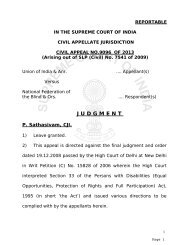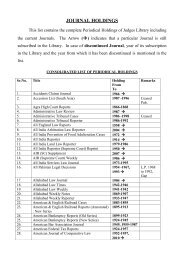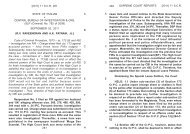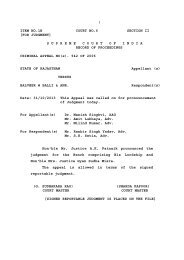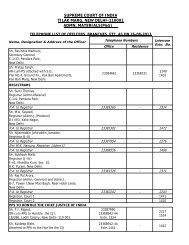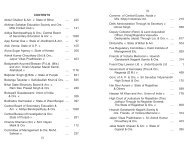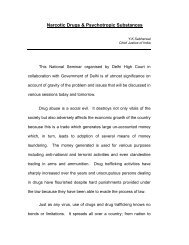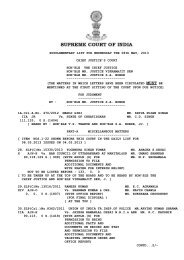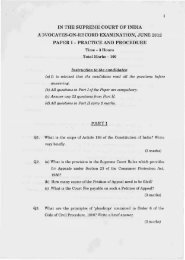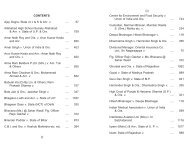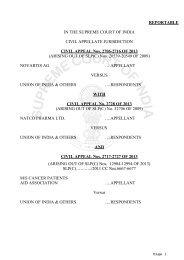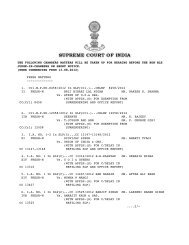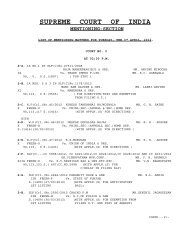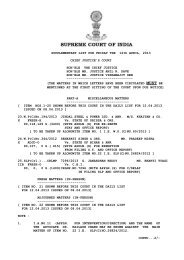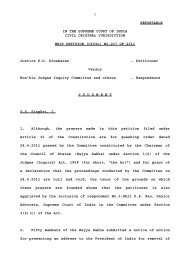Part No.IV - Supreme Court of India
Part No.IV - Supreme Court of India
Part No.IV - Supreme Court of India
You also want an ePaper? Increase the reach of your titles
YUMPU automatically turns print PDFs into web optimized ePapers that Google loves.
SARADAMANI KANDAPPAN v. S. RAJALAKSHMI &<br />
ORS.<br />
between the plaintiff and defendants, defendant no.4 gave<br />
evidence on behalf <strong>of</strong> all the other defendants – <strong>No</strong>nexamination<br />
<strong>of</strong> defendants 1 to 3 – Held: When one <strong>of</strong> the<br />
defendants who was conversant with the facts has given<br />
evidence, it was not necessary for the other defendants to be<br />
examined as witnesses to duplicate the evidence – Where the<br />
entire transaction has been conducted through a particular<br />
agent or representative, the principal has to examine that<br />
agent to prove the transaction; and that where the principal at<br />
no point <strong>of</strong> time had personally handled or dealt with or<br />
participated in the transaction and has no personal knowledge<br />
<strong>of</strong> the transaction, and where the entire transaction has been<br />
handled by the agent, necessarily the agent alone can give<br />
evidence in regard to the transaction – Therefore, the<br />
evidence <strong>of</strong> the fourth defendant was sufficient to put forth the<br />
case <strong>of</strong> the defendants and there was no need to examine the<br />
other three defendants who did not have full or complete<br />
knowledge <strong>of</strong> the transactions.<br />
The respondent nos. 2, 3 and 4 were respectively the<br />
son, daughter and husband <strong>of</strong> the first respondent. They<br />
owned the suit properties which they agreed to sell to the<br />
appellant for Rs.3.75 lacs on 17.1.1981. On the date <strong>of</strong><br />
agreement, Rs.1 lac was paid as advance to respondents.<br />
As per the agreement, the appellant was to pay Rs.1 lac<br />
on or before 28.2.1981, Rs.1 lac on or before 6.4.1981 and<br />
Rs.75000 on or before 30.5.1981. Clause 6 <strong>of</strong> agreement<br />
stated that the payment on due dates was the essence<br />
<strong>of</strong> the contract and in case <strong>of</strong> failure on the part <strong>of</strong> the<br />
appellant, the respondents would cancel the agreement.<br />
On the same day (i.e. 17.1.1981), respondent no.4 in a<br />
letter addressed to the appellant acknowledged the<br />
receipt <strong>of</strong> Rs.1.25 lacs paid on various dates as<br />
commission for the said transaction relating to sale <strong>of</strong> suit<br />
properties. By the said letter, he agreed that in case the<br />
transaction <strong>of</strong> sale remained unconcluded or got<br />
cancelled because <strong>of</strong> default on the part <strong>of</strong> the sellers or<br />
879 880<br />
A<br />
B<br />
C<br />
D<br />
E<br />
F<br />
G<br />
H<br />
A<br />
B<br />
C<br />
D<br />
E<br />
F<br />
G<br />
H<br />
SUPREME COURT REPORTS [2011] 8 S.C.R.<br />
buyer or because <strong>of</strong> defective title, the entire amount <strong>of</strong><br />
Rs.1.25 lacs received by him as commission would be<br />
refunded. In pursuance <strong>of</strong> the said agreement the<br />
appellant paid further advances <strong>of</strong> Rs.1,00,000 on<br />
28.2.1981 and <strong>of</strong> Rs.25,000 on 2.4.1981. The balance <strong>of</strong><br />
75,000 in regard to the instalment payable on 6.4.1981 and<br />
the last instalment <strong>of</strong> Rs.75,000 payable on or before<br />
30.5.1981 was not paid by the appellant.<br />
Respondent nos.1 to 3 sent a notice to the appellant<br />
cancelling the agreement dated 17.1.1981 on the ground<br />
<strong>of</strong> default in payment <strong>of</strong> the balance <strong>of</strong> the sale<br />
consideration in exercise <strong>of</strong> their right to cancel the<br />
agreement on such default under clause 6 <strong>of</strong> the<br />
agreement. The appellant sent a reply that time was<br />
never intended to be the essence <strong>of</strong> the agreement; that<br />
respondents failed to produce the original documents <strong>of</strong><br />
title inspite <strong>of</strong> repeated demands and, therefore, it was<br />
agreed between the appellant’s husband and the fourth<br />
respondent during discussions held in March 1981 in the<br />
presence <strong>of</strong> witnesses that the original documents would<br />
be made available as soon as possible and the appellant<br />
would pay the balance only thereafter and that sale would<br />
be completed within a reasonable time <strong>of</strong> handing over<br />
the documents and, therefore, a further advance <strong>of</strong><br />
Rs.25000 was received on 2.4.1981. Thereafter, the<br />
appellant got a notice published in the newspaper<br />
informing the public about the said sale transaction. One<br />
‘G’ sent a response notice that the documents relating to<br />
the suit properties were deposited with him and if the<br />
appellant purchased the said lands, she would be doing<br />
at her own risk. A notice was also sent by the<br />
respondents stating that the claim <strong>of</strong> the appellant that<br />
she purchased the said land and was in possession<br />
there<strong>of</strong> and was cultivating them was false; the survey<br />
numbers mentioned in the notice were erroneous; that<br />
after the agreement dated 17.1.1981 was cancelled, they



